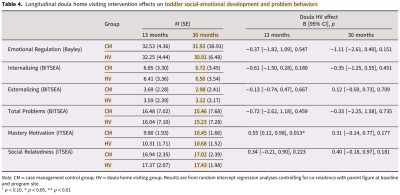Randomized Controlled Trial (RCT) of a...
Doula Home Visiting Program for Low-Income Mothers
Reviewed
Development & Psychopathology (December 2022) published an RCT of a program that provides home visiting and doula visits to low-income women starting in pregnancy. Despite the positive portrayal of results in the study’s abstract, the study found no discernible impact on child outcomes and little impact on parent practices, at age 30 months.
This longitudinal randomized controlled trial examined the impact of a doula home visiting intervention for young, low-income mothers on parenting and toddler social-emotional development and tested whether intervention effects were moderated by maternal emotional and behavioral health characteristics. 156 mothers were offered home visits from a home visitor starting in mid-pregnancy through several years postpartum, with a community doula also working with the mother during pregnancy and after the birth. 156 received case management. Interviews, video recordings of mother-child interactions, and toddler assessments were conducted at 3 weeks, 3 months, 13 months, and 30 months of age. Intent-to-treat analyses conducted with the full sample showed some intervention effects. Moderation analyses, however, showed that most effects were concentrated among mothers engaged in high levels of risk-taking (delinquent behaviors, school suspensions, smoking, alcohol use, sexual risk-taking). Among higher risk-taking mothers, the intervention was related to less intrusiveness during early infancy, less psychological and physical aggression during toddlerhood, more sensitive parenting attitudes, and greater toddler social relatedness. Maternal depressive symptoms were only a moderator for toddler behavior problems. These findings suggest that doula home visiting may be a particularly effective model for enhancing sensitive, non-aggressive parenting among young mothers with a history of risk-taking behavior.
This longitudinal randomized controlled trial examined the impact of a doula home visiting intervention for young, low-income mothers on parenting and toddler social-emotional development and tested whether intervention effects were moderated by maternal emotional and behavioral health characteristics. 156 mothers were offered home visits from a home visitor starting in mid-pregnancy through several years postpartum, with a community doula also working with the mother during pregnancy and after the birth. 156 received case management. Interviews, video recordings of mother-child interactions, and toddler assessments were conducted at 3 weeks, 3 months, 13 months, and 30 months of age. Intent-to-treat analyses conducted with the full sample showed some intervention effects.
few sustained intervention effects on child social-emotional or behavioral outcomes, or on parenting practices and attitudes. Exploratory moderation analyses, however, were conducted to identify potential hypotheses for future research.
Moderation analyses, however, showed that most effects were concentrated
These analyses show possible effects
among mothers engaged in high levels of risk-taking (delinquent behaviors, school suspensions, smoking, alcohol use, sexual risk-taking). Among higher risk-taking mothers, the intervention was related to less intrusiveness during early infancy, less psychological and physical aggression during toddlerhood, more sensitive parenting attitudes, and greater toddler social relatedness. Maternal depressive symptoms were only a moderator for toddler behavior problems. These findings, suggest that doula home visiting may be a particularly effective model for enhancing sensitive, non-aggressive parenting among young mothers with a history of risk-taking behavior.
for the subgroup of young mothers with a history of risk-taking behavior, may warrant examination in future studies.
No-Spin's Study Overview
High-quality RCT of a doula home visiting program found no discernible impact on child outcomes and little impact on parent practices, at age 30 months.
Program:
- The program provided home visits from both a paraprofessional and a doula to young, low-income women starting in pregnancy. A doula is a health educator from the community often with similar background to the women, who provides support in pregnancy, childbirth and postpartum.
Study Design:
- The study randomly assigned 312 women to treatment (home visits) vs. control (usual care, consisting of light-touch case management). Based on careful review, this was a high-quality RCT (e.g., baseline balance, attrition within WWC standards, blinded assessors).
Findings:
- At the longest-term follow-up (child age 30 months), the study found no discernible impact on any child social-emotional or behavioral outcome - see chart below (note similar outcomes scores for treatment ("HV") vs control ("CM")).

- The study also found a statistically significant impact on only 1 of 9 measured parenting practices and attitudes at 30 months (the 1 could be a chance finding resulting from measurement of many outcomes). Modest parenting impacts in earlier study follow-ups had mostly faded by 30 months.
- In exploratory analyses, the study found potential positive effects among the subgroup of mothers with a history of risk-taking (e.g., delinquent behavior, smoking). These results should be considered preliminary until replicated in future research.
Click or tap a highlight to see No-Spin’s comment